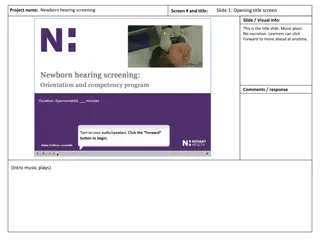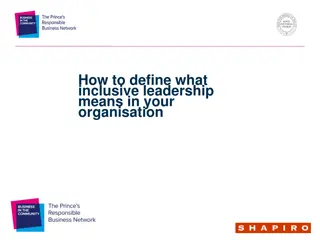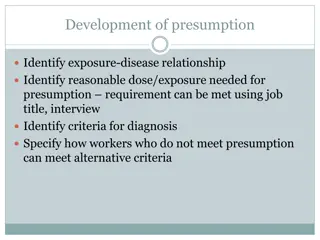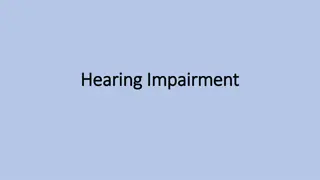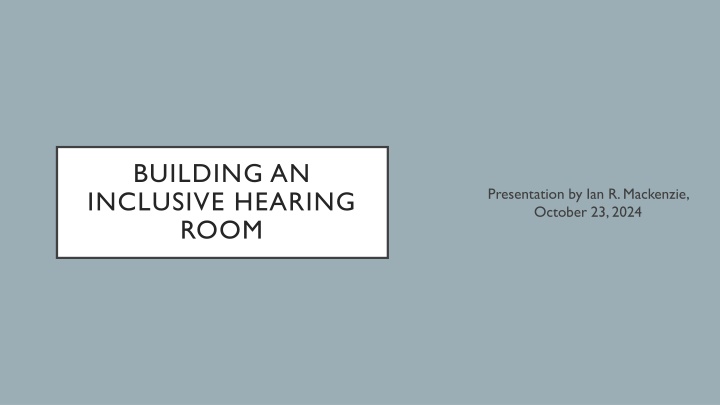
Creating an Inclusive Hearing Room: Key Insights & Strategies
Gain valuable insights on building an inclusive hearing room as presented by Ian R. MacKenzie. Explore the importance of inclusion, understanding the players involved, duty of accommodation, and maintaining civility. Learn about impartiality, access to justice, and the role of tribunals in fostering inclusivity within legal proceedings.
Download Presentation

Please find below an Image/Link to download the presentation.
The content on the website is provided AS IS for your information and personal use only. It may not be sold, licensed, or shared on other websites without obtaining consent from the author. If you encounter any issues during the download, it is possible that the publisher has removed the file from their server.
You are allowed to download the files provided on this website for personal or commercial use, subject to the condition that they are used lawfully. All files are the property of their respective owners.
The content on the website is provided AS IS for your information and personal use only. It may not be sold, licensed, or shared on other websites without obtaining consent from the author.
E N D
Presentation Transcript
BUILDING AN INCLUSIVE HEARING ROOM Presentation by Ian R. Mackenzie, October 23, 2024
A little bit about me Defining Inclusion The players and their differences Setting the stage for the hearing OVERVIEW Duty of Accommodation Pronouns and pronunciation Maintaining civility
Lawyer by training, via journalism/editing Advocate private sector lawyer and in-house roles Neutral since 2002 Federal Public Sector Labour Relations and Employment Board MY BACKGROUND Human Rights Tribunal of Ontario Workplace Safety and insurance Appeals Tribunal Independent arbitrator and mediator Writer/Trainer/Facilitator
Broad definition: the act of including : the state of being included (Merriam-Webster) Under Diversity, Equity, Inclusion (DEI) initiatives it has a narrower focus: DEFINING INCLUSION Inclusion means groups/individuals having different backgrounds are culturally and socially accepted, welcomed, and equally treated. The experience aims to benefit all those involved and there is clear participation . (Inclusion Action in Ontario) This presentation focuses on the broad definition, which incorporates the DEI perspective
The adjudicator (or panel) Tribunal staff (in some cases) THE PLAYERS AND THEIR DIFFERENCES The parties The representatives Witnesses Public observers (mostly with an interest in the proceedings friends, family, colleagues..)
An adjudicator must not only be impartial (show no favour) but also appear to be impartial: Committee for Justice & Liberty v. Canada (National Energy Board), [1978] 1 S.C.R. 369, at p. 394: An informed person, viewing the matter realistically and practically and having thought the matter through would conclude that the adjudicator would (consciously or unconsciously) decide fairly IMPARTIALITY AND INCLUSION Always context-specific Consistency is important (legitimate expectations) Differential treatment can be a strong indicator of partiality or bias
Tribunals were set up to provide expeditious access to justice Access to justice : ACCESS TO JUSTICE AND INCLUSION a relatively barrier-free access to dispute resolution, including an adequate opportunity to know the issues and be heard Understandable processes or processes that are explained in layperson terms Accommodation of needs of all participants to allow them to participate meaningfully
Tribunal guides/FAQs/Hearing Notice SETTING THE STAGE FOR THE HEARING Role of representatives Opening statement from adjudicator What do the hearing participants (players) need to know before the hearing starts? What needs repeating?
Definition of Duty of Accommodation: making changes to rules, standards, policies, tribunal culture, and physical environments to eliminate or reduce the negative impact that someone faces because of a protected ground of discrimination; Reasonable steps must be taken up to the point of undue hardship ; DUTY OF ACCOMMODATION Duty only applies when tribunal/adjudicator knows of accommodation need (expressly or indirectly); Person requesting accommodation must cooperate in solution and is not entitled to their preferred solution
What is the Tribunals obligation vs the Adjudicator s obligation? Areas to pay attention to: Physical accommodation HEARING CONSIDERATIONS AND DUTY OF ACCOMMODATION Breaks (mental and physical health) Family responsibility accommodation (start and end times) Adjudicator s obligation to raise systemic barriers with Tribunal
Outline: Names and pronouns HEARING MANAGEMENT Plain language Active adjudication Enforcing civility
IMPORTANCE OF LANGUAGE
There are few things more important than ones name. It reflects one s identity, individuality and human dignity. Adam Dodek Consistent mispronunciation can lead to feeling excluded and that the adjudicator is biased (or just doesn t care) PRONUNCIATION AND PRONOUNS Effort to get it right is as important as getting it right
Practice directions/rules of procedure should tell parties and representatives how they can advise the tribunal of the pronunciation of their name/preferred pronoun Tribunals should update standard practices to include a request for pronunciation, using the phonetic or syllabic method, of all names when participants are introduced When in doubt, the adjudicator should be encouraged to request confirmation of pronunciation Correct pronunciation for all parties and lawyers should also be verified by the adjudicator or tribunal staff present, prior to the hearing BEST PRACTICES
Review the file prior to the hearing identify names of representatives, parties and potential witnesses Do your research prior to the hearing internet or tribunal staff/colleague TIPS FOR THE ADJUDICATOR Keep a list beside you with names, preferred pronouns, and phonetic spellings (if necessary) Ask all participants to identify themselves do not single out any one participant
Explain hearing process in plain language If legal representatives use legal terms in submissions either interpret those terms for the other participants, or ask the representative to do so PLAIN LANGUAGE Always confirm with the representative that you have accurately captured their point Don t use legal terms without explaining them (e.g., prima facie, bona fide) If you use humour only self-deprecating kind is appropriate (and should be used with caution)
Active adjudication Decorum and civility setting up the guardrails MAINTAINING CIVILITY/CONTROLLING THE HEARING Tools to control bad behaviour of participants and observers Actions to take after the hearing if necessary
An adjudicator may engage in firm, robust and continuous hearing management: to anticipate problems before they arise, to avoid undue delay and an unnecessarily protracted proceeding, ACTIVE ADJUDICATION to maintain order and momentum, to ensure that admissible evidence only is presented in a clear and organized manner focused on the real issues, and to have regard to judicious use of limited resources. Chanachowicz v Winona Wood Limited, 2016 ONSC 160
Be firm on your expectations of all participants in the hearing Be consistent in enforcing/applying civility standards Depending on the infraction, a warning may be the appropriate first step ESTABLISHING THE GUARDRAILS A recess can be a useful tool to calm participants Avoid public humiliation take the representatives aside to discuss first If necessary, remind legal representatives of their legal obligations to the tribunal and to the other party/parties
Observers: a warning that any further outbursts will result in them being removed from the hearing room TOOLS TO CONTROL BAD BEHAVIOURS Parties and representatives: cooling off recess and/or a chat outside of the hearing room (or conference call before reconvening in a continuation) Witnesses: firm guidance in the hearing room (in the presence of all parties)
Reflection what went wrong/what went right? Discussions with colleagues (leading to lessons learned ) Alert colleagues of problematic conduct (a heads up ) AFTER THE HEARING Raise significant concerns with the Tribunal Chair Tribunal Chair may raise concerns directly with representative s principal, if behaviour is either significantly egregious or repetitive If legal representative is ungovernable , Chair could initiate complaint to regulator
Hearings are new experiences for many parties, most witnesses and observers Try to see the hearing through their eyes what seems routine/normal for adjudicators and representatives is novel for newbies CONCLUSION Hearings are stressful in particular for parties and witnesses an adjudicator cannot eliminate that stress, but can help to reduce it (and be understanding about how stress can manifest itself) Practicing Inclusion is not only the right thing to do it is also sound hearing management practice
My weekly newsletter on Substack: An Adjudicator s Toolkit HOW TO REACH ME Slaw: https://www.slaw.ca/author/mackenzie/ LinkedIn (https://ca.linkedin.com/in/irmackenzie) Email (included on resource sheet)

